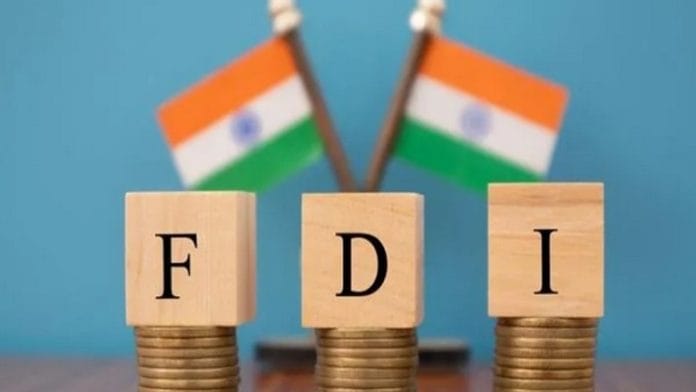New Delhi: Large amounts of money being taken out by foreign companies from India is in fact a reflection of a “success story” of the country’s stock market and strong valuations, the Economic Survey 2024-25 has said.
However, the Survey, presented in Parliament Friday by Union Finance Minister Nirmala Sitharaman and prepared by Chief Economic Advisor V. Anantha Nageswaran, also cautioned that these outflows could mean the government would have to adjust its current account deficit levels.
According to the data presented in the survey, gross foreign direct investment (FDI) increased from $47.2 billion in the first eight months of FY24 to $55.6 billion in the same period of FY25, a growth of 17.9 percent.
However, the survey also said the government must be mindful of the net FDI numbers as well. Net FDI is the difference between the direct investment coming into the country and the amount companies take out in the form of repatriation and disinvestment.
‘More exits & IPOs show investor confidence’
ThePrint has previously reported on how the net FDI figure came in at a 12-year low this year, driven by a surge in repatriation and disinvestments, a trend that the Economic Survey has now acknowledged.
“Even though gross FDI inflows to India have increased in the first eight months of FY25, it has been accompanied by a rise in repatriations as international companies realised returns from investments,” the Survey noted. “Many multinational companies have capitalised on India’s strong stock market through secondary sales and Initial Public Offerings, indicating investor confidence.”
It also noted that 2024 also saw an increase in private equity-backed exits, citing an analysis by Avendus Spark of government data, which showed that private equity and venture capital exit from Indian stock markets stood at $19.5 billion from January to September 2024, higher than $18.3 billion in the corresponding period of the previous year.
“The depth and resilience of the Indian capital market offer profitable exits for direct investors, boosting future investments,” it added. “To a large extent, this is a success story as foreigners take profits.”
Also Read: As growth slows & capex falls, Economic Survey suggests prioritising ‘efficient’ investment
Need to reevaluate CAD
The survey pointed out that India remains a strong destination for FDI, ranking high in greenfield project announcements and international project finance deals.
“However, the country has to pay heed to numbers,” it said. “The last two financial years have indeed seen much larger repatriation from India.”
The amounts of repatriation were $29.3 billion and $44.5 billion, respectively, in FY23 and FY24. In the current year, up to November, the repatriation amount is $39.6 billion.
“At this rate, the full-year figure might exceed last year’s figure,” the survey noted.
While the jump in repatriations from India reflect a “success story”, the large outflows of direct investment are nevertheless significant because India runs a current account deficit (CAD) and has significant investment needs, the Survey said. A current account deficit basically occurs when a country has less money coming in than going out.
“If, for various reasons, capital flows are going to be problematic, it raises questions as to the level of sustainable CAD for India,” the Survey noted. “It may not be 2.5 percent to 3 percent as before, but it is much lower.”
It noted that the prevailing wisdom used to be that a country can run as large a CAD as the rest of the world (RoW) is willing to finance. However, in the current reality, India would have to adjust its expectations.
“If the RoW is unwilling or unable to do so for various reasons, then the size of the CAD will have to be lower,” it said. “Developed countries, too, are wooing investments, and India is not competing with other emerging economies alone.”
The two options before India
In light of this, India has two choices before it. The first is to “pull out all stops” in trying to woo foreign companies and their investments.
In furtherance of this, the Survey said that there is room to improve tax certainty and tax stability in matters such as Advance Pricing Agreements.
“India has simplified many of its laws, rules and regulations over the years leading to a regime shift in terms of the ease of doing business compared to yesteryears,” it said. “At the same time, all statutory and regulatory authorities must bear in mind that international investors benchmark countries cross-sectionally and not longitudinally.”
The second option is to make the existing investments yield more than they currently are.
“In other words, if the investment rate cannot be increased because of capital constraints, then investment efficiency has to go up,” it said. “That is where deregulation and ‘Ease of Doing Business’ come into play.”
(Edited by Tony Rai)
Also Read: Over-regulation is holding back MSME growth, states need to lead in easing these: Economic Survey






